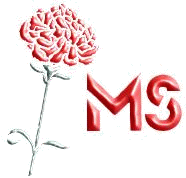


 Multiple sclerosis is a chronic, degenerative progressive disease that attacks the white matter of the central nervous system. Through a process known as demyelination, it destroys the myelin sheath. The myelin sheath is the coating on nerve fibers that allows rapid and efficient nerve conduction in the brain and spinal cord. With decresed myelin levels, normal impulses are inhibited. Multiple sclerosis generally affects people between the ages of 20 and 40 and women are twice as likely to develop the disease. The cause of multiple sclerosis is still unknown however suspected causes include an autoimmune reaction, a virus, genetic factors, or a combination of these. |
|
 Symptoms of MS are unpredictable and vary from person to person and from time to time in the same person. For example, one person may experience abnormal fatigue, while another might have severe vision problems. A person with MS could have loss of balance and muscle coordination making walking difficult; another person with MS could have slurred speech, tremors, stiffness, and bladder problems. While some symptoms will come and go over the course of the disease, others may be more lasting. Most Common Symptoms: bladder dysfunction, bowel dysfunction, changes in cognitive function, dizziness and vertigo, emotional problems, fatigue, difficulty in walking, numbness, pain, sexual dysfunction, visual problems Less Common Symptoms: headache, hearing loss, itching, seizures, spasticity, speech and swallowing disorders, tremor |

|

|
 There is no known cure for MS. Goals of treatment are to shorten exacerbations and if possible, relieve neurologic deficits so persons with MS can resume a normal life. Pharmacologic Therapy: Immunotherapeutic medications – prevent destruction of nerve tissue by suppressing the immune system and decreasing inflammation. Complementary and Alternative Medicine (CAM): Alternative medicine includes everything from drugs and diet to food supplements, mental exercises, and lifestyle changes. These therapies come from many different disciplines and traditions—yoga, hypnosis, guided imagery, relaxation techniques, traditional herbal healing, Chinese medicine, macrobiotics, naturopathy, and many others. |